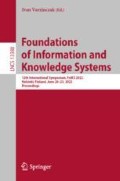Abstract
System W is a recently introduced inference method for conditional belief bases with some notable properties like capturing system Z and thus rational closure and, in contrast to system Z, fully satisfying syntax splitting. This paper further investigates properties of system W. We show how system W behaves with respect to postulates put forward for nonmonotonic reasoning like rational monotony, weak rational monotony, or semi-monotony. We develop tailored postulates ensuring syntax splitting for any inference operator based on a strict partial order on worlds. By showing that system W satisfies these axioms, we obtain an alternative and more general proof that system W satisfies syntax splitting. We explore how syntax splitting affects the strict partial order underlying system W and exploit this for answering certain queries without having to determine the complete strict partial order. Furthermore, we investigate the relationships among system W and other inference methods, showing that, for instance, lexicographic inference extends both system W and c-inference, and leading to a full map of interrelationships among various inductive inference operators.
Access this chapter
Tax calculation will be finalised at checkout
Purchases are for personal use only
References
Adams, E.: The logic of conditionals. Inquiry 8(1–4), 166–197 (1965)
Beierle, C., Eichhorn, C., Kern-Isberner, G., Kutsch, S.: Properties of skeptical c-inference for conditional knowledge bases and its realization as a constraint satisfaction problem. Ann. Math. Artif. Intell. 83(3–4), 247–275 (2018)
Beierle, C., Eichhorn, C., Kern-Isberner, G., Kutsch, S.: Properties and interrelationships of skeptical, weakly skeptical, and credulous inference induced by classes of minimal models. Artif. Intell. 297, 103489 (2021)
Beierle, C., Haldimann, J.: Normal forms of conditional belief bases respecting inductive inference. In: Keshtkar, F., Franklin, M. (eds.) Proceedings of the Thirty-Fifth International Florida Artificial Intelligence Research Society Conference (FLAIRS), Hutchinson Island, Florida, USA, 15–18 May 2022 (2022)
Beierle, C., Haldimann, J.: Normal forms of conditional knowledge bases respecting system p-entailments and signature renamings. Ann. Math. Artif. Intell. 90(2), 149–179 (2022)
Benferhat, S., Cayrol, C., Dubois, D., Lang, J., Prade, H.: Inconsistency management and prioritized syntax-based entailment. In: Proceedings of IJCAI 1993, vol. 1, pp. 640–647. Morgan Kaufmann Publishers, San Francisco (1993)
Darwiche, A., Pearl, J.: On the logic of iterated belief revision. Artif. Intell. 89(1–2), 1–29 (1997)
de Finetti, B.: La prévision, ses lois logiques et ses sources subjectives. Ann. Inst. H. Poincaré 7(1), 1–68 (1937). Engl. transl. Theory of Probability, J. Wiley & Sons, 1974
Goldszmidt, M., Pearl, J.: Qualitative probabilities for default reasoning, belief revision, and causal modeling. Artif. Intell. 84(1–2), 57–112 (1996)
Haldimann, J., Beierle, C.: Inference with system W satisfies syntax splitting. In: Principles of Knowledge Representation and Reasoning: Proceedings of the 19th International Conference, KR 2022, Haifa, Israel, 31 July–5 August 2022 (2022, to appear)
Heyninck, J., Kern-Isberner, G., Meyer, T.: Lexicographic entailment, syntax splitting and the drowning problem. In: 31st International Joint Conference on Artificial Intelligence, IJCAI 2022. ijcai.org (2022, to appear)
Kern-Isberner, G.: Conditionals in Nonmonotonic Reasoning and Belief Revision. LNCS, vol. 2087. Springer, Heidelberg (2001). https://doi.org/10.1007/3-540-44600-1_3
Kern-Isberner, G.: A thorough axiomatization of a principle of conditional preservation in belief revision. Ann. Math. Artif. Intell. 40(1–2), 127–164 (2004)
Kern-Isberner, G., Beierle, C., Brewka, G.: Syntax splitting = relevance + independence: New postulates for nonmonotonic reasoning from conditional belief bases. In: Calvanese, D., Erdem, E., Thielscher, M. (eds.) Principles of Knowledge Representation and Reasoning: Proceedings of the 17th International Conference, KR 2020, pp. 560–571. IJCAI Organization (2020)
Kern-Isberner, G., Brewka, G.: Strong syntax splitting for iterated belief revision. In: IJCAI-2017, pp. 1131–1137 (2017)
Kern-Isberner, G., Eichhorn, C.: Structural inference from conditional knowledge bases. Stud. Logica. 102(4), 751–769 (2014)
Komo, C., Beierle, C.: Nonmonotonic inferences with qualitative conditionals based on preferred structures on worlds. In: Schmid, U., Klügl, F., Wolter, D. (eds.) KI 2020. LNCS (LNAI), vol. 12325, pp. 102–115. Springer, Cham (2020). https://doi.org/10.1007/978-3-030-58285-2_8
Komo, C., Beierle, C.: Nonmonotonic reasoning from conditional knowledge bases with system W. Ann. Math. Artif. Intell. 90(1), 107–144 (2021). https://doi.org/10.1007/s10472-021-09777-9
Kraus, S., Lehmann, D., Magidor, M.: Nonmonotonic reasoning, preferential models and cumulative logics. Artif. Intell. 44(1–2), 167–207 (1990)
Kutsch, S., Beierle, C.: InfOCF-Web: an online tool for nonmonotonic reasoning with conditionals and ranking functions. In: Zhou, Z. (ed.) Proceedings of the Thirtieth International Joint Conference on Artificial Intelligence, IJCAI 2021, Virtual Event/Montreal, Canada, 19–27 August 2021, pp. 4996–4999. ijcai.org (2021)
Lehmann, D., Magidor, M.: What does a conditional knowledge base entail? Artif. Intell. 55, 1–60 (1992)
Lehmann, D.: Another perspective on default reasoning. Ann. Math. Artif. Intell. 15(1), 61–82 (1995). https://doi.org/10.1007/BF01535841
Parikh, R.: Beliefs, belief revision, and splitting languages. Logic Lang. Comput. 2, 266–278 (1999)
Pearl, J.: System Z: a natural ordering of defaults with tractable applications to nonmonotonic reasoning. In: Proceedings of TARK 1990, pp. 121–135. Morgan Kaufmann (1990)
Peppas, P., Williams, M.A., Chopra, S., Foo, N.Y.: Relevance in belief revision. Artif. Intell. 229((1–2)), 126–138 (2015)
Reiter, R.: A logic for default reasoning. Artif. Intell. 13, 81–132 (1980)
Spohn, W.: Ordinal conditional functions: a dynamic theory of epistemic states. In: Harper, W., Skyrms, B. (eds.) Causation in Decision, Belief Change, and Statistics, II, pp. 105–134. Kluwer Academic Publishers (1988)
Acknowledgement
We thank the anonymous reviewers for their detailed and helpful comments. This work was supported by the Deutsche Forschungsgemeinschaft (DFG, German Research Foundation), grant BE 1700/10-1 awarded to Christoph Beierle as part of the priority program “Intentional Forgetting in Organizations” (SPP 1921).
Author information
Authors and Affiliations
Corresponding author
Editor information
Editors and Affiliations
Rights and permissions
Copyright information
© 2022 The Author(s), under exclusive license to Springer Nature Switzerland AG
About this paper
Cite this paper
Haldimann, J., Beierle, C. (2022). Properties of System W and Its Relationships to Other Inductive Inference Operators. In: Varzinczak, I. (eds) Foundations of Information and Knowledge Systems. FoIKS 2022. Lecture Notes in Computer Science. Springer, Cham. https://doi.org/10.1007/978-3-031-11321-5_12
Download citation
DOI: https://doi.org/10.1007/978-3-031-11321-5_12
Published:
Publisher Name: Springer, Cham
Print ISBN: 978-3-031-11320-8
Online ISBN: 978-3-031-11321-5
eBook Packages: Computer ScienceComputer Science (R0)

